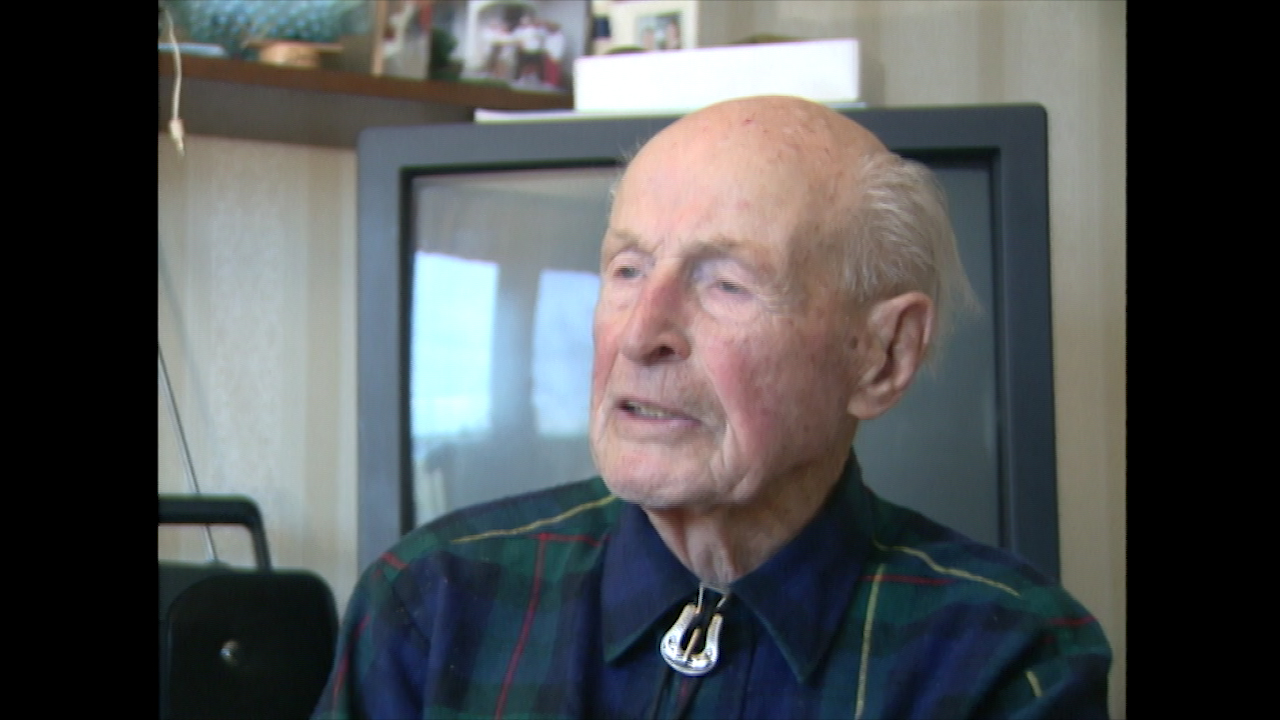I was present when the German general staff surrendered to the
Canadian Corps. I saw the general staff of the German Army
and all its war time regalia, march up in Valenciennes
to the Canadian Corps. You'd think that they were victors
instead of vanquished. They had all their glory with them.
It must have been very tough on them. It could have been us.
Interviewer: What was your reaction when you saw this?
One of great relief, no more bombing, no more strafing,
no more artillery fire. The bombing was, I think,
the toughest thing to take.
Interviewer: Why's that?
You never knew where it was coming. You couldn't hear it
or anything. If you didn't hear it, that's just too bad.
Interviewer: The, at the end of the war, the Canadian troops were
asked to occupy portions of Germany. Were you involved in that?
I was involved in that. I was selected to go with the Canadian
corps from Mons. We met at Mons and I have a diary of it.
I will show you. We met in Mons on a certain day and that was
possibly the 11th or 12th of November we met in Mons. And we
assembled to go to Bonn. Trucks, London buses were stationed
there and I have a record of their movement right into Bonn,
right into Bonn. We stayed there most of the winter.
Interviewer: What were the German people like?
They were, we had strict instructions that there were no
intercourse with the enemy. But that wasn`t always the truth.
They was, we made friends with some of the German people.
They were disappointed but they were relieved. And they knew then
they were going to have something to eat. That was the big thing.
I think possibly the starvation point was very close.
My recollection was everybody was happy.
Interviewer: So there was no bitterness against the Canadians?
We went into Bonn and there was a bit... they had a big statue
of Wilhelmine in this square and some of the troops got a
little bit rowdy, out of hand and they demolished it.
And there was a court marshal over that.
Very strict punishment for that, it was replaced, no doubt,
but the Canadian corps were having none of that.
Interviewer: The Canadian troops in occupation,
were they generally well behaved?
Oh extremely well behaved. We were well treated and we had,
it was a long time ago, but I can remember getting passes to go
down to Cologne and (inaudible) and Antwerp and all these places
on the railway, or on the river and we had a pretty fair time.
We were under war time discipline but we had generous
leaves to go down to these places.
Interviewer: When you'd come across former German soldiers,
men the same age as you, that you knew were probably fighting,
just a few months ago, what reaction would you have?
Mine might have been a little different from others. I had just
lost by brother and it, I didn't show any anger towards them
at all. Because I realized that they were in the same boat as
we were. They did what they were told to do, and what they did
for the love of the fatherland. I can give you an instance.
After the war was over, my father taught German immigrants the
English language in the schools where he lived and there were
all German soldiers who were coming to Canada as immigrants.
That showed the spirit of the minister that he was.
Interviewer: And no doubt they've become good Canadians.
Good Canadians.






